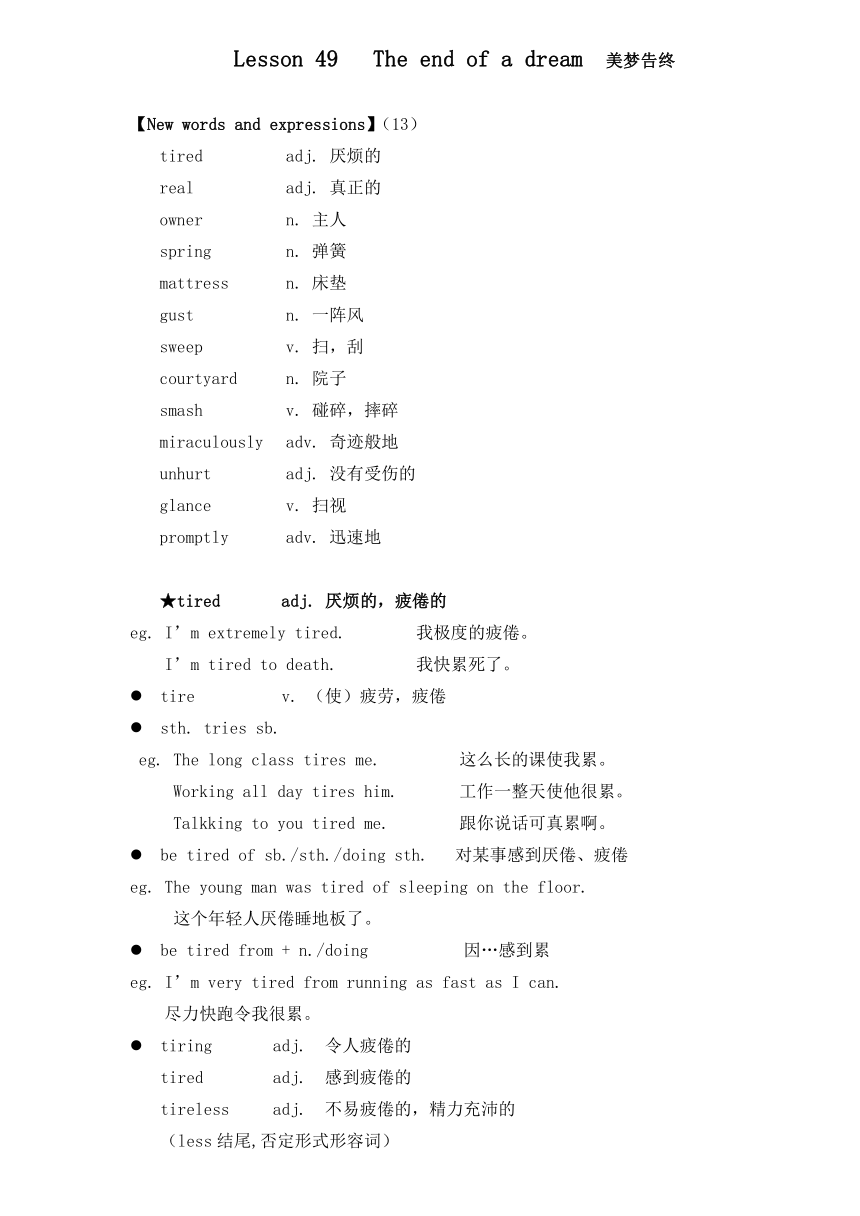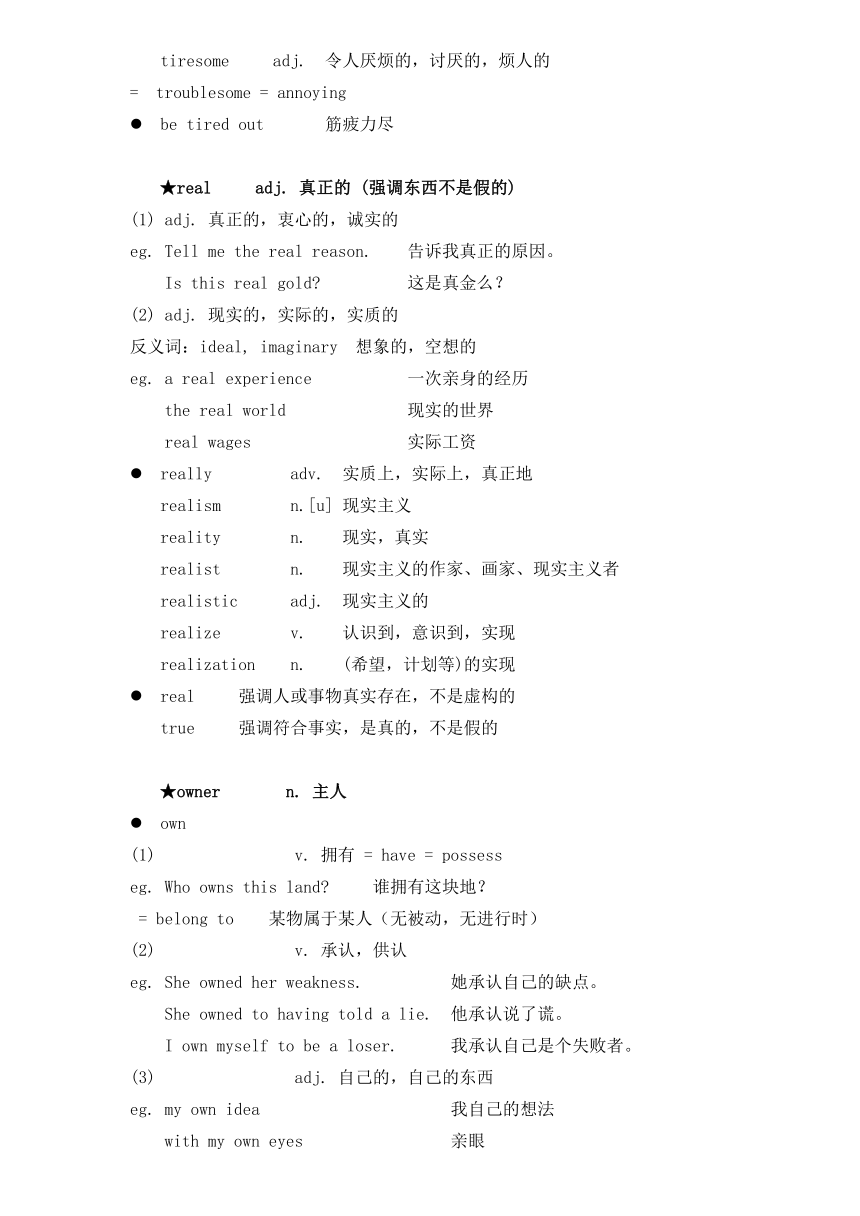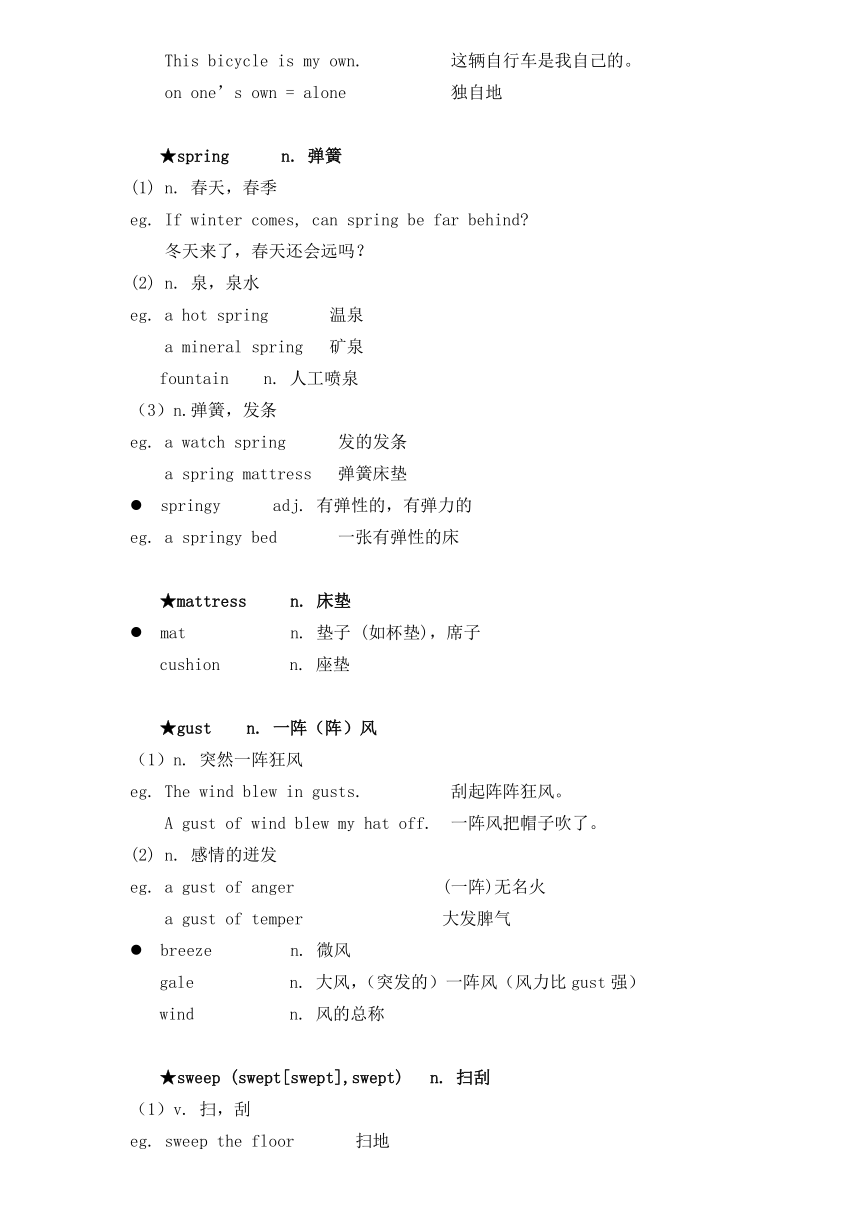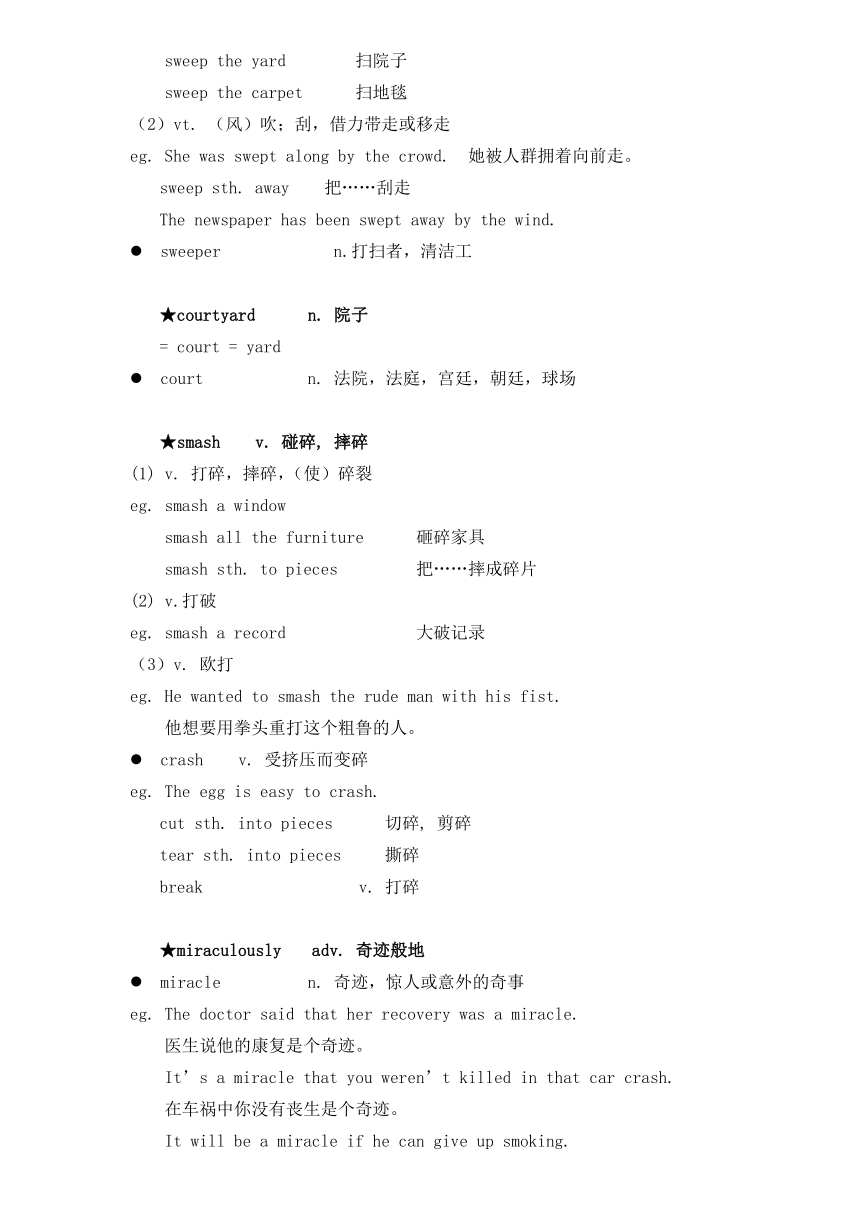新概念英语二册超详教案讲义笔记Lesson 49 The end of a dream 美梦告终
文档属性
| 名称 | 新概念英语二册超详教案讲义笔记Lesson 49 The end of a dream 美梦告终 |  | |
| 格式 | docx | ||
| 文件大小 | 35.7KB | ||
| 资源类型 | 教案 | ||
| 版本资源 | 新概念英语 | ||
| 科目 | 英语 | ||
| 更新时间 | 2023-09-26 07:01:40 | ||
图片预览




文档简介
Lesson 49 The end of a dream 美梦告终
【New words and expressions】(13)
tired adj. 厌烦的
real adj. 真正的
owner n. 主人
spring n. 弹簧
mattress n. 床垫
gust n. 一阵风
sweep v. 扫,刮
courtyard n. 院子
smash v. 碰碎,摔碎
miraculously adv. 奇迹般地
unhurt adj. 没有受伤的
glance v. 扫视
promptly adv. 迅速地
★tired adj. 厌烦的,疲倦的
eg. I’m extremely tired. 我极度的疲倦。
I’m tired to death. 我快累死了。
tire v. (使)疲劳,疲倦
sth. tries sb.
eg. The long class tires me. 这么长的课使我累。
Working all day tires him. 工作一整天使他很累。
Talkking to you tired me. 跟你说话可真累啊。
be tired of sb./sth./doing sth. 对某事感到厌倦、疲倦
eg. The young man was tired of sleeping on the floor.
这个年轻人厌倦睡地板了。
be tired from + n./doing 因…感到累
eg. I’m very tired from running as fast as I can.
尽力快跑令我很累。
tiring adj. 令人疲倦的
tired adj. 感到疲倦的
tireless adj. 不易疲倦的,精力充沛的
(less结尾,否定形式形容词)
tiresome adj. 令人厌烦的,讨厌的,烦人的
= troublesome = annoying
be tired out 筋疲力尽
★real adj. 真正的 (强调东西不是假的)
(1) adj. 真正的,衷心的,诚实的
eg. Tell me the real reason. 告诉我真正的原因。
Is this real gold 这是真金么?
(2) adj. 现实的,实际的,实质的
反义词:ideal, imaginary 想象的,空想的
eg. a real experience 一次亲身的经历
the real world 现实的世界
real wages 实际工资
really adv. 实质上,实际上,真正地
realism n.[u] 现实主义
reality n. 现实,真实
realist n. 现实主义的作家、画家、现实主义者
realistic adj. 现实主义的
realize v. 认识到,意识到,实现
realization n. (希望,计划等)的实现
real 强调人或事物真实存在,不是虚构的
true 强调符合事实,是真的,不是假的
★owner n. 主人
own
v. 拥有 = have = possess
eg. Who owns this land 谁拥有这块地?
= belong to 某物属于某人(无被动,无进行时)
v. 承认,供认
eg. She owned her weakness. 她承认自己的缺点。
She owned to having told a lie. 他承认说了谎。
I own myself to be a loser. 我承认自己是个失败者。
adj. 自己的,自己的东西
eg. my own idea 我自己的想法
with my own eyes 亲眼
This bicycle is my own. 这辆自行车是我自己的。
on one’s own = alone 独自地
★spring n. 弹簧
(1) n. 春天,春季
eg. If winter comes, can spring be far behind
冬天来了,春天还会远吗?
(2) n. 泉,泉水
eg. a hot spring 温泉
a mineral spring 矿泉
fountain n. 人工喷泉
(3)n.弹簧,发条
eg. a watch spring 发的发条
a spring mattress 弹簧床垫
springy adj. 有弹性的,有弹力的
eg. a springy bed 一张有弹性的床
★mattress n. 床垫
mat n. 垫子 (如杯垫),席子
cushion n. 座垫
★gust n. 一阵(阵)风
(1)n. 突然一阵狂风
eg. The wind blew in gusts. 刮起阵阵狂风。
A gust of wind blew my hat off. 一阵风把帽子吹了。
(2) n. 感情的迸发
eg. a gust of anger (一阵)无名火
a gust of temper 大发脾气
breeze n. 微风
gale n. 大风,(突发的)一阵风(风力比gust强)
wind n. 风的总称
★sweep (swept[swept],swept) n. 扫刮
(1)v. 扫,刮
eg. sweep the floor 扫地
sweep the yard 扫院子
sweep the carpet 扫地毯
(2)vt. (风)吹;刮,借力带走或移走
eg. She was swept along by the crowd. 她被人群拥着向前走。
sweep sth. away 把……刮走
The newspaper has been swept away by the wind.
sweeper n.打扫者,清洁工
★courtyard n. 院子
= court = yard
court n. 法院,法庭,宫廷,朝廷,球场
★smash v. 碰碎, 摔碎
(1) v. 打碎,摔碎,(使)碎裂
eg. smash a window
smash all the furniture 砸碎家具
smash sth. to pieces 把……摔成碎片
(2) v.打破
eg. smash a record 大破记录
(3)v. 欧打
eg. He wanted to smash the rude man with his fist.
他想要用拳头重打这个粗鲁的人。
crash v. 受挤压而变碎
eg. The egg is easy to crash.
cut sth. into pieces 切碎, 剪碎
tear sth. into pieces 撕碎
break v. 打碎
★miraculously adv. 奇迹般地
miracle n. 奇迹,惊人或意外的奇事
eg. The doctor said that her recovery was a miracle.
医生说他的康复是个奇迹。
It’s a miracle that you weren’t killed in that car crash.
在车祸中你没有丧生是个奇迹。
It will be a miracle if he can give up smoking.
要是他能戒烟真是个奇迹了。
miraculous adj. 奇迹般的
eg. make a miraculous recovery 奇迹般的康复
★unhurt adj. 没有受伤的
(1) v. (hurt, hurt) 使(肉体或精神、情感上)受伤,伤害
eg. He felt hurt at your words. 他对你的话感到受伤。
He jumped from the top of the wall and hurt his leg.
他从墙上跳下来,弄伤了腿。
My shoes hurt. 我的鞋子穿了很疼。
(2)n. 伤
eg. slight hurt 轻伤(slight adj.微小的,细小的)
serious hurt 重伤
Did you suffer any hurt in the accident
你在事故中受伤了吗?
This failure was a great hurt to me. 这次失败对我是个很重的打击。
I mean no hurt to her feelings. 我没打算伤害她的感情。
injure v.伤害
(比hurt正式,指损害健康、成就、容貌等,强调功能的损失)
eg. Drinking and smoking can injure one’s health.
喝酒和吸烟伤害人的身体。
harm v.伤害
(用于肉体或精神上的伤害均可,有时可指引起不安或不便,还可以用于抽象事物,尤指不道德的事物)
eg. Don’t harm your eyes by reading in bed. 别躺在床上看书伤害眼睛。
damage v.损害
(强调对于物的损害,强调对于价值、用途、外观等造成的损失)
eg. He damaged my car with a stone. 他用石头砸坏了我的车。
Our clavichord was damaged by a visitor.(L:10)
我们的古钢琴被一个客人弄坏了。
wound v.伤(强调枪伤、刀伤、刺伤等皮肉之伤,特指战场上受伤)
eg. That soldier was badly wounded in the war.
那个士兵在战场上受伤很严重。
★glance v. 扫视
(1)v. 一瞥,看一眼
glance at 扫了一眼(有意识地看)
glance through 浏览
glance over 浏览
glance round 环视
eg. The old man glanced at the boy. 那个老人瞥了一眼小男孩。
He glanced throught the newspaper. 他扫了一眼报纸。
The teacher glanced round the classroom. 老师扫视了一圈教室。
(2)n. 瞥见
eg. take a glance at the TV programs 瞧一下电视节目
= give a glance at the TV programs
★promptly adv. 迅速地
= soon = quickly
prompt adj. 即时的,迅速的,准时的
eg. a prompt reply 迅速地回答
make prompt payment 即时付款
He was prompt to act. 他迅速行动。
【Text】
Tired of sleeping on the floor, a young man in Teheran saved up for years to buy a real bed. For the first time in his life, he became the proud owner of a bed which had springs and a mattress. Because the weather was very hot, he carried the bed on to the roof of his house. He slept very well for the first two nights, but on the third night, a storm blew up. A gust of wind swept the bed off the roof and sent it crashing into the courtyard below. The young man did not wake up until the bed had struck the ground. Although the bed was smashed to pieces, the man was miraculously unhurt. When he woke up, he was still on the mattress. Glancing at the bits of wood and metal that lay around him, the man sadly picked up the mattress and carried it into his house. After he had put it on the floor, he promptly went to sleep again.
参考译文
德黑兰的一个年轻人由于对睡地板感到厌倦, 于是积蓄多年买了一张真正的床. 他平生第一次自豪地拥有了一张既有弹簧又带床垫的床. 由于天气很热, 他便把床搬到了他的屋顶上. 头两天晚上, 他睡得非常好. 但第三天晚上起了风暴. 一阵大风把床从屋顶上刮了下来, 把它摔碎在下面的院子里. 那年轻人直到床撞到地上才醒了过来. 尽管床摔成了碎片, 但年轻人却奇迹般地没有受伤. 他醒来时, 仍然躺在床垫上. 年轻人看了一眼周围的碎木片和碎金属片, 伤心地捡起了床垫, 把它拿进了屋. 他把床垫往地板上一放, 很快又睡着了.
【课文讲解】
1、Tired of sleeping on the floor, a young man in Teheran saved up for years to buy a real bed.
be tired of 对……感到厌倦(在这句话里省略了现在分词being,用形容词短语直接做原因状语,其作用相当于原因状语从句as he was tired of…。)
= Because he was tired of sleeping on the floor. (原因状语从句)
save up 攒钱,储蓄(常与for连用)
2、For the first time in his life, he became the proud owner of a bed which had springs and a mattress.
for the first time in one's life 平生第一次
which had springs and a mattress引导定语从句修饰bed
3、Because the weather was very hot, he carried the bed on to the roof of his house.
because引导原因状语从句
on to/onto (人和物)指改变高低位置的移动,通常指从低处到高处
in to/into
eg. The cat jumped on to the table. 猫跳到桌子上去了。
Mr. Thompson jumped onto the stage. 汤普森先生跳到台上。
Mr. Thompson jumped on the stage. 汤普森先生在台上跳。
I drove on to the next town. 我继续开车,去往下个镇。
4、He slept very well for the first two nights, but on the third night, a storm blew up.
for the first two nights 头两天晚上
on the third night 在第三天晚上
(在具体的某一天晚上,用介词on)
on Sunday night 在星期天晚上
blow up
风越刮越大(程度在加深),(指暴风雨)出现并加剧;刮起
speak up 大声点
5、A gust of wind swept the bed off the roof and sent it crashing into the courtyard below.
gust表示“一阵强风,一阵狂风”,既可单独使用,也可用a gust of wind
sweep the bed off the roof 把床从房顶掀了下去
sent it crashing into the courtyard below 使他摔碎在下面的院子里
(it是宾语,crashing into the courtyard below 是现在分词短语做宾语补足语。)
crash (不及物动词)直接用主动形式,smash(及物动词)可用被动
一个句子中不能出现两个动词,如果出现了两个动词,要用and或but连接;或者把其中一个作为非谓语动词to do(表目的),-ed(表被动),-ing(表主动)。
6、The young man did not wake up until the bed had struck the ground.
until/not… until (L:2 Breakfast or lunch中出现过)
until: 主句中动词为延续性动词
not… until:主句中动词为非延续性动词(即瞬间动词)
eg. I’ll stay here until Monday. 我要在这儿呆到星期一。
I won’t leave until Monday. 我要到星期一才离开。
7、Although the bed was smashed to pieces, the man was miraculously unhurt.
although 尽管 = though 虽然 , 引导让步状语从句
to pieces 粉碎地,成碎片地
eg. The cup was broken to pieces. 杯子摔得粉碎。
8、When he woke up, he was still on the mattress.
wake up 醒来
9、Glancing at the bits of wood and metal that lay around him, the man sadly picked up the mattress and carried it into his house.
glancing为现在分词短语,引导的短语相当于一个时间状语从句after he glanced at…。动词的ing形式一定强调某一个名词之间的主动关系。
that lay around him 中的that引导定语从句修饰wood和metal
bits of = a bit of 小片的
a bit of news/paper 一张/一片/一块
eg. There are bits of broken glass on the floor. 地上有碎玻璃片。
metal [u]/[c] 金属
a piece of metal 一块金属
lie around him 散落在周围
lie (lay,lain) 不及物动词,后面一定要加“around”,不能说成“lay him”。
10、After he had put it on the floor, he promptly went to sleep again.
after引导时间状语从句
put…on… 把…放在…上
【Key structures】
主从复合句的语序
主从复合句:用连词把一些有内在联系的简单句连在一起便组成了主从复合句,常见的连词有:
when, until, after, as soon as, while, before引导时间状语从句
because, as, since引导原因状语从句
to, in order to 目的关系
although让步关系
who, which, that引导定语从句
【New words and expressions】(13)
tired adj. 厌烦的
real adj. 真正的
owner n. 主人
spring n. 弹簧
mattress n. 床垫
gust n. 一阵风
sweep v. 扫,刮
courtyard n. 院子
smash v. 碰碎,摔碎
miraculously adv. 奇迹般地
unhurt adj. 没有受伤的
glance v. 扫视
promptly adv. 迅速地
★tired adj. 厌烦的,疲倦的
eg. I’m extremely tired. 我极度的疲倦。
I’m tired to death. 我快累死了。
tire v. (使)疲劳,疲倦
sth. tries sb.
eg. The long class tires me. 这么长的课使我累。
Working all day tires him. 工作一整天使他很累。
Talkking to you tired me. 跟你说话可真累啊。
be tired of sb./sth./doing sth. 对某事感到厌倦、疲倦
eg. The young man was tired of sleeping on the floor.
这个年轻人厌倦睡地板了。
be tired from + n./doing 因…感到累
eg. I’m very tired from running as fast as I can.
尽力快跑令我很累。
tiring adj. 令人疲倦的
tired adj. 感到疲倦的
tireless adj. 不易疲倦的,精力充沛的
(less结尾,否定形式形容词)
tiresome adj. 令人厌烦的,讨厌的,烦人的
= troublesome = annoying
be tired out 筋疲力尽
★real adj. 真正的 (强调东西不是假的)
(1) adj. 真正的,衷心的,诚实的
eg. Tell me the real reason. 告诉我真正的原因。
Is this real gold 这是真金么?
(2) adj. 现实的,实际的,实质的
反义词:ideal, imaginary 想象的,空想的
eg. a real experience 一次亲身的经历
the real world 现实的世界
real wages 实际工资
really adv. 实质上,实际上,真正地
realism n.[u] 现实主义
reality n. 现实,真实
realist n. 现实主义的作家、画家、现实主义者
realistic adj. 现实主义的
realize v. 认识到,意识到,实现
realization n. (希望,计划等)的实现
real 强调人或事物真实存在,不是虚构的
true 强调符合事实,是真的,不是假的
★owner n. 主人
own
v. 拥有 = have = possess
eg. Who owns this land 谁拥有这块地?
= belong to 某物属于某人(无被动,无进行时)
v. 承认,供认
eg. She owned her weakness. 她承认自己的缺点。
She owned to having told a lie. 他承认说了谎。
I own myself to be a loser. 我承认自己是个失败者。
adj. 自己的,自己的东西
eg. my own idea 我自己的想法
with my own eyes 亲眼
This bicycle is my own. 这辆自行车是我自己的。
on one’s own = alone 独自地
★spring n. 弹簧
(1) n. 春天,春季
eg. If winter comes, can spring be far behind
冬天来了,春天还会远吗?
(2) n. 泉,泉水
eg. a hot spring 温泉
a mineral spring 矿泉
fountain n. 人工喷泉
(3)n.弹簧,发条
eg. a watch spring 发的发条
a spring mattress 弹簧床垫
springy adj. 有弹性的,有弹力的
eg. a springy bed 一张有弹性的床
★mattress n. 床垫
mat n. 垫子 (如杯垫),席子
cushion n. 座垫
★gust n. 一阵(阵)风
(1)n. 突然一阵狂风
eg. The wind blew in gusts. 刮起阵阵狂风。
A gust of wind blew my hat off. 一阵风把帽子吹了。
(2) n. 感情的迸发
eg. a gust of anger (一阵)无名火
a gust of temper 大发脾气
breeze n. 微风
gale n. 大风,(突发的)一阵风(风力比gust强)
wind n. 风的总称
★sweep (swept[swept],swept) n. 扫刮
(1)v. 扫,刮
eg. sweep the floor 扫地
sweep the yard 扫院子
sweep the carpet 扫地毯
(2)vt. (风)吹;刮,借力带走或移走
eg. She was swept along by the crowd. 她被人群拥着向前走。
sweep sth. away 把……刮走
The newspaper has been swept away by the wind.
sweeper n.打扫者,清洁工
★courtyard n. 院子
= court = yard
court n. 法院,法庭,宫廷,朝廷,球场
★smash v. 碰碎, 摔碎
(1) v. 打碎,摔碎,(使)碎裂
eg. smash a window
smash all the furniture 砸碎家具
smash sth. to pieces 把……摔成碎片
(2) v.打破
eg. smash a record 大破记录
(3)v. 欧打
eg. He wanted to smash the rude man with his fist.
他想要用拳头重打这个粗鲁的人。
crash v. 受挤压而变碎
eg. The egg is easy to crash.
cut sth. into pieces 切碎, 剪碎
tear sth. into pieces 撕碎
break v. 打碎
★miraculously adv. 奇迹般地
miracle n. 奇迹,惊人或意外的奇事
eg. The doctor said that her recovery was a miracle.
医生说他的康复是个奇迹。
It’s a miracle that you weren’t killed in that car crash.
在车祸中你没有丧生是个奇迹。
It will be a miracle if he can give up smoking.
要是他能戒烟真是个奇迹了。
miraculous adj. 奇迹般的
eg. make a miraculous recovery 奇迹般的康复
★unhurt adj. 没有受伤的
(1) v. (hurt, hurt) 使(肉体或精神、情感上)受伤,伤害
eg. He felt hurt at your words. 他对你的话感到受伤。
He jumped from the top of the wall and hurt his leg.
他从墙上跳下来,弄伤了腿。
My shoes hurt. 我的鞋子穿了很疼。
(2)n. 伤
eg. slight hurt 轻伤(slight adj.微小的,细小的)
serious hurt 重伤
Did you suffer any hurt in the accident
你在事故中受伤了吗?
This failure was a great hurt to me. 这次失败对我是个很重的打击。
I mean no hurt to her feelings. 我没打算伤害她的感情。
injure v.伤害
(比hurt正式,指损害健康、成就、容貌等,强调功能的损失)
eg. Drinking and smoking can injure one’s health.
喝酒和吸烟伤害人的身体。
harm v.伤害
(用于肉体或精神上的伤害均可,有时可指引起不安或不便,还可以用于抽象事物,尤指不道德的事物)
eg. Don’t harm your eyes by reading in bed. 别躺在床上看书伤害眼睛。
damage v.损害
(强调对于物的损害,强调对于价值、用途、外观等造成的损失)
eg. He damaged my car with a stone. 他用石头砸坏了我的车。
Our clavichord was damaged by a visitor.(L:10)
我们的古钢琴被一个客人弄坏了。
wound v.伤(强调枪伤、刀伤、刺伤等皮肉之伤,特指战场上受伤)
eg. That soldier was badly wounded in the war.
那个士兵在战场上受伤很严重。
★glance v. 扫视
(1)v. 一瞥,看一眼
glance at 扫了一眼(有意识地看)
glance through 浏览
glance over 浏览
glance round 环视
eg. The old man glanced at the boy. 那个老人瞥了一眼小男孩。
He glanced throught the newspaper. 他扫了一眼报纸。
The teacher glanced round the classroom. 老师扫视了一圈教室。
(2)n. 瞥见
eg. take a glance at the TV programs 瞧一下电视节目
= give a glance at the TV programs
★promptly adv. 迅速地
= soon = quickly
prompt adj. 即时的,迅速的,准时的
eg. a prompt reply 迅速地回答
make prompt payment 即时付款
He was prompt to act. 他迅速行动。
【Text】
Tired of sleeping on the floor, a young man in Teheran saved up for years to buy a real bed. For the first time in his life, he became the proud owner of a bed which had springs and a mattress. Because the weather was very hot, he carried the bed on to the roof of his house. He slept very well for the first two nights, but on the third night, a storm blew up. A gust of wind swept the bed off the roof and sent it crashing into the courtyard below. The young man did not wake up until the bed had struck the ground. Although the bed was smashed to pieces, the man was miraculously unhurt. When he woke up, he was still on the mattress. Glancing at the bits of wood and metal that lay around him, the man sadly picked up the mattress and carried it into his house. After he had put it on the floor, he promptly went to sleep again.
参考译文
德黑兰的一个年轻人由于对睡地板感到厌倦, 于是积蓄多年买了一张真正的床. 他平生第一次自豪地拥有了一张既有弹簧又带床垫的床. 由于天气很热, 他便把床搬到了他的屋顶上. 头两天晚上, 他睡得非常好. 但第三天晚上起了风暴. 一阵大风把床从屋顶上刮了下来, 把它摔碎在下面的院子里. 那年轻人直到床撞到地上才醒了过来. 尽管床摔成了碎片, 但年轻人却奇迹般地没有受伤. 他醒来时, 仍然躺在床垫上. 年轻人看了一眼周围的碎木片和碎金属片, 伤心地捡起了床垫, 把它拿进了屋. 他把床垫往地板上一放, 很快又睡着了.
【课文讲解】
1、Tired of sleeping on the floor, a young man in Teheran saved up for years to buy a real bed.
be tired of 对……感到厌倦(在这句话里省略了现在分词being,用形容词短语直接做原因状语,其作用相当于原因状语从句as he was tired of…。)
= Because he was tired of sleeping on the floor. (原因状语从句)
save up 攒钱,储蓄(常与for连用)
2、For the first time in his life, he became the proud owner of a bed which had springs and a mattress.
for the first time in one's life 平生第一次
which had springs and a mattress引导定语从句修饰bed
3、Because the weather was very hot, he carried the bed on to the roof of his house.
because引导原因状语从句
on to/onto (人和物)指改变高低位置的移动,通常指从低处到高处
in to/into
eg. The cat jumped on to the table. 猫跳到桌子上去了。
Mr. Thompson jumped onto the stage. 汤普森先生跳到台上。
Mr. Thompson jumped on the stage. 汤普森先生在台上跳。
I drove on to the next town. 我继续开车,去往下个镇。
4、He slept very well for the first two nights, but on the third night, a storm blew up.
for the first two nights 头两天晚上
on the third night 在第三天晚上
(在具体的某一天晚上,用介词on)
on Sunday night 在星期天晚上
blow up
风越刮越大(程度在加深),(指暴风雨)出现并加剧;刮起
speak up 大声点
5、A gust of wind swept the bed off the roof and sent it crashing into the courtyard below.
gust表示“一阵强风,一阵狂风”,既可单独使用,也可用a gust of wind
sweep the bed off the roof 把床从房顶掀了下去
sent it crashing into the courtyard below 使他摔碎在下面的院子里
(it是宾语,crashing into the courtyard below 是现在分词短语做宾语补足语。)
crash (不及物动词)直接用主动形式,smash(及物动词)可用被动
一个句子中不能出现两个动词,如果出现了两个动词,要用and或but连接;或者把其中一个作为非谓语动词to do(表目的),-ed(表被动),-ing(表主动)。
6、The young man did not wake up until the bed had struck the ground.
until/not… until (L:2 Breakfast or lunch中出现过)
until: 主句中动词为延续性动词
not… until:主句中动词为非延续性动词(即瞬间动词)
eg. I’ll stay here until Monday. 我要在这儿呆到星期一。
I won’t leave until Monday. 我要到星期一才离开。
7、Although the bed was smashed to pieces, the man was miraculously unhurt.
although 尽管 = though 虽然 , 引导让步状语从句
to pieces 粉碎地,成碎片地
eg. The cup was broken to pieces. 杯子摔得粉碎。
8、When he woke up, he was still on the mattress.
wake up 醒来
9、Glancing at the bits of wood and metal that lay around him, the man sadly picked up the mattress and carried it into his house.
glancing为现在分词短语,引导的短语相当于一个时间状语从句after he glanced at…。动词的ing形式一定强调某一个名词之间的主动关系。
that lay around him 中的that引导定语从句修饰wood和metal
bits of = a bit of 小片的
a bit of news/paper 一张/一片/一块
eg. There are bits of broken glass on the floor. 地上有碎玻璃片。
metal [u]/[c] 金属
a piece of metal 一块金属
lie around him 散落在周围
lie (lay,lain) 不及物动词,后面一定要加“around”,不能说成“lay him”。
10、After he had put it on the floor, he promptly went to sleep again.
after引导时间状语从句
put…on… 把…放在…上
【Key structures】
主从复合句的语序
主从复合句:用连词把一些有内在联系的简单句连在一起便组成了主从复合句,常见的连词有:
when, until, after, as soon as, while, before引导时间状语从句
because, as, since引导原因状语从句
to, in order to 目的关系
although让步关系
who, which, that引导定语从句
同课章节目录
